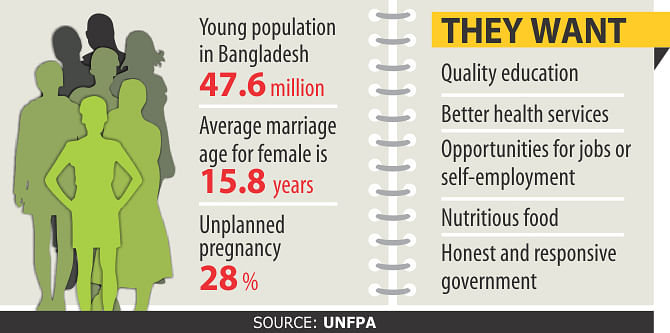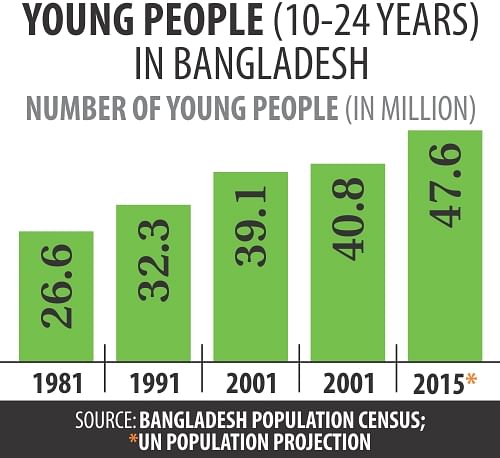Rise of youth
Rise of youth
UNFPA asks Bangladesh, other developing nations to invest heavily on young people to build a better future

It is time for the youth in Bangladesh and beyond.
The young population across the globe has reached a remarkable 1.8 billion out of 7.3 billion, and most of them live in developing countries like Bangladesh.
The developing nations with large youth populations have been urged to invest heavily on them for their quality education and health services for economic and social gains.
“If they are equipped with necessary skills, good health and effective choices, they present an enormous opportunity to transform the future,” said UNFPA Bangladesh Representative Argentina Matavel.
Like elsewhere, the United Nations Population Fund (UNFPA) launched the State of World Population Report 2014: “The power of 1.8 billion: adolescents, youth and the transformation of the future” in Bangladesh yesterday.
Some 47.6 million or 30 percent of the total 158.5 million people in Bangladesh are young (10-24 years), and it will be between 10 and 19 percent by 2050, according to it.
 “This means that Bangladesh needs to invest right now in the human capital of its young people if it wants to reap the benefits of a large demographic dividend,” said the report presented at the Jatiya Press Club.
“This means that Bangladesh needs to invest right now in the human capital of its young people if it wants to reap the benefits of a large demographic dividend,” said the report presented at the Jatiya Press Club.
Matavel said Bangladesh has done well in terms of primary school enrolment, reducing birth rate and maternal and child mortality rates, but child marriage is still a threat to human health.
Average marriage age of women in Bangladesh is 15.8, and 65 percent of girls are married off before the age of 18 while 69 percent of deliveries take place at homes.
“Now the major question is the quality of education. Are those completing their education can compete in the global level? … The issue must be looked into seriously,” said Matavel.
Stressing the need for introducing sex education in Bangladesh, Matavel said there is no religious bar to imparting sex education to young people.
“Otherwise, they learn from friends and internet, and that may be wrong,” she added.
According to the UNFPA report, despite the governments' greater attention to them, the youths still confront many obstacles that keep them from safely transitioning into adulthood and the workforce.
“Tens of millions do not go to school, or if they do, they miss even minimum benchmarks for learning,” it said.
Employment prospects are often dismal, with jobs unavailable or poor in quality, leading to worsening global youth unemployment crisis.
Up to 60 percent of young people in developing regions are not working or in school, or have only irregular jobs, it said.
In Bangladesh, two million young people enter the labour market every year, but a large number of them are either jobless or have irregular jobs, said Population Council Country Director Ubaidur Rob.
Each woman aged between 15 and 49 now has 2.2 children, meaning that Bangladesh's population would stabilise at 200 million in a few years, said Ubaidur.
Bangladesh now has a huge young population. If the country can ensure proper education and health services for youths, it can become a developed nation, he said.
According to the UNFPA report, “The dividend comes as resources are freed for economic development, and for greater per-capita spending on higher quality health and education services.”
“Thus, Economic growth takes off. A virtuous cycle begins where capabilities and opportunities continuously expand.”
The report suggested making adequate investments in childhood vaccination, primary health, sanitation and safe drinking water to reduce child mortality; secondary education, sex education and health services to empower girls; equal opportunities for all youths and their participation in civic activities and policy making.
It urged governments to ensure equal opportunities for health services, education, jobs and wider participation of the young people in the policy-making and civic activities.
The report also recommended proper macro-economic management, open trade, good governance and well-functioning labour and financial markets to spur economic growth and expand employment of young people.
State Minister for Health and Family Welfare Zahid Maleque said Bangladesh has been implementing policies and programmes to give young people quality education and provide better health services.
The results are reflected in social and economic indicators, he said.